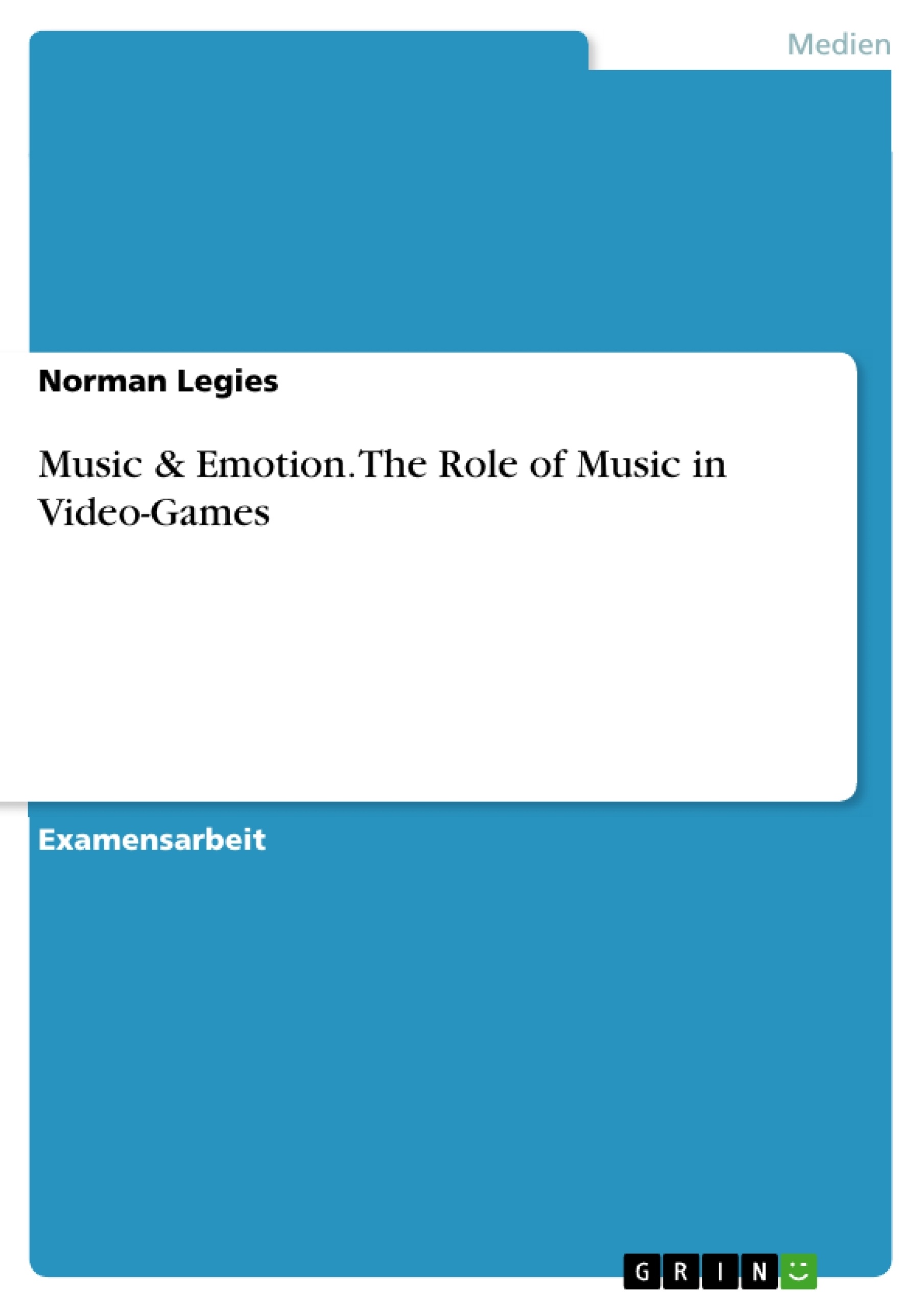The purpose of this research is to combine theories of manipulative use of music with videogaming. In recent years, video-gaming has become more important, due to an ever rising popularity among children, teenagers and adults alike. The first part researches general facts about music listening in different environments, while the second and third part concentrate on video-game genres and their music, the theory of composing, as well as the social impact and phenomena arising from the increase of video-gaming in pop-culture awareness. Specific uses of video-game music are presented with recommended listening examples. With a broad approach to many aspects of music use, mood manipulation and video-game soundtracks, this paper may serve as a guidepost to further research in the field of studies of music and emotion in popular media. I was in awe: How could a scene in a game stir up so many emotions, remind of so many personal quarrels and yet comfort and soothe a young teenager, all but within a virtual world? Even when the controller was put aside, watching or remembering the scenery and story unfold, a feeling of reassurance and companionship with the protagonists came alive. Humming their melodies or quoting their wisdoms – at that time video-games were in critical observation by parents, friends and society – with an almost rebellious intent, the motivation arose to further examine and not let go of this medium. The songs were always so memorable, as they came by easily and fit a multiplicity of personal experiences. Nowadays, with video-games becoming part of main-stream media, players might still face criticism from often half-hearted examinations of video-games in news reports. Yet now, there is a community to share, speak and play with. With the increasing use of the internet, people are able to communicate with each other, duel each other with virtual cards, play mini-games, or fight strategic battles – all sharing their own proper experiences with the games' soundtracks. However, with a relatively new medium such as video-games, delving deeper into why they are becoming more and more popular is difficult. With almost a century of filmmaking dominating the entertainment industry, video-gaming created a new niche of entertainment. Collins is one of few to explore these “invaders in our homes”. The use of music in video-gaming in general is even less examined. Juslin and Sloboda assembled data and essays examining the correlation of music and emotion.
Inhaltsverzeichnis
- Introduction
- General perception of music and sound
- Everyday versus specified events
- Musical and autobiographical memory
- Music sources: Mood manipulation
- Mood enhancement
- The effects of musical factors
- Instrumentation
- Difficulties of music effect evaluation
- Video game music and sound
- Overview of the history of video game music
- The pretence of realism and immersion
- The paradoxical use of consonance and dissonance
- The composer's struggle
- Composition techniques
- Genres of video games and their use of music
- Role playing, adventure and action games
- Simulation games
- Horror and emotionally disturbing games
- Music games
- Discussing transgression and phenomena of music from games in media
- Habituation and change
- Escapism and its value
- Pop-culture and brand recognition
- Gamers watching gamers playing games
Zielsetzung und Themenschwerpunkte
Diese Forschungsarbeit analysiert die manipulative Wirkung von Musik im Kontext von Videospielen. Angesichts der wachsenden Beliebtheit von Videospielen bei Kindern, Jugendlichen und Erwachsenen, wird der Einfluss von Musik auf Emotionen und Spielverhalten untersucht. Der Fokus liegt auf den verschiedenen Genres von Videospielen und deren spezifischer Musikverwendung, den Kompositionstechniken sowie den gesellschaftlichen Auswirkungen und Phänomenen, die mit dem zunehmenden Einfluss von Videospielen in der Populärkultur verbunden sind.
- Die Rolle von Musik in der Emotionsregulation
- Die Gestaltung von Spielatmosphäre und Immersion durch Musik
- Die Verwendung von Musik in verschiedenen Videospielgenres
- Der Einfluss von Videospielmusik auf die Populärkultur
- Die Bedeutung von Musik für die Spielergemeinschaft
Zusammenfassung der Kapitel
Die Arbeit beginnt mit einer Untersuchung der allgemeinen Wahrnehmung von Musik und Klang. Sie betrachtet die Rolle von Musik in alltäglichen Situationen und in spezifischen Ereignissen, untersucht den Zusammenhang zwischen musikalischem Gedächtnis und autobiografischem Gedächtnis und analysiert die Manipulation von Stimmungen durch Musik.
Im zweiten Teil wird die Verwendung von Musik in Videospielen genauer betrachtet. Es wird ein Überblick über die Geschichte der Videospielmusik gegeben und die Bedeutung von Realismus und Immersion durch Musik beleuchtet. Die Arbeit untersucht auch die paradoxen Einsatzmöglichkeiten von Konsonanz und Dissonanz in Videospielmusik sowie die Herausforderungen, die sich für Komponisten stellen.
Die Arbeit analysiert anschließend die Verwendung von Musik in verschiedenen Videospielgenres, wie Rollenspielen, Abenteuerspielen, Actionspielen, Simulationsspielen, Horrorspielen und Musikspielen. Dabei werden die unterschiedlichen Funktionen und Effekte der Musik in den jeweiligen Genres betrachtet.
Der letzte Teil der Arbeit widmet sich der Diskussion von Phänomenen im Zusammenhang mit Videospielmusik und deren Verbreitung in der Medienlandschaft. Es werden Themen wie Gewöhnung, Eska pismus, Populärkultur und die Rolle von Gaming-Communities beleuchtet.
Schlüsselwörter
Die Arbeit befasst sich mit den Themen Musik, Emotion, Videospiele, Emotionsregulation, Gedächtnis, Kultur, Komposition, Genres, Immersion, Populärkultur, Spielergemeinschaft, Gewöhnung, Eska pismus. Die Analyse basiert auf wissenschaftlichen Theorien und empirischen Forschungsergebnissen.
- Citar trabajo
- Norman Legies (Autor), 2015, Music & Emotion. The Role of Music in Video-Games, Múnich, GRIN Verlag, https://www.grin.com/document/437797




